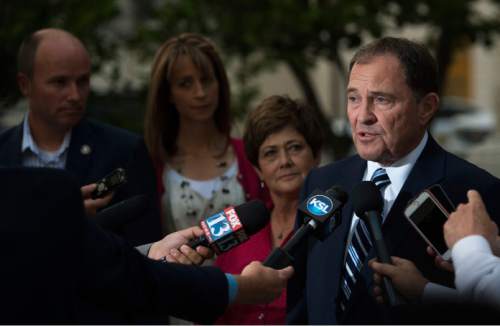This is an archived article that was published on sltrib.com in 2016, and information in the article may be outdated. It is provided only for personal research purposes and may not be reprinted.
Same candidates. Same basic platforms. Same obscene levels of campaign spending. Very different results.
Gov. Gary Herbert's bid for re-election hit a speed bump when he came second to challenger Jonathan Johnson, by a margin of 55 percent to 45 percent, at the state Republican Convention in April. But in Tuesday's primary, the governor thumped the libertarian businessman, polling more than 70 percent of the Republican electorate.
The obvious, and unsurprising, conclusion to draw from those numbers is that the 4,000 or so delegates who voted in the convention have absolutely no claim of being representative of the more than 224,000 duly registered Republicans who voted in the primary.
And that the efforts that Republican Party leaders continue to make to preserve the primacy of the caucus/convention system is about guarding their own power, not building a legitimate, representative form of government.
The results support the notion, pushed first by the Count My Vote initiative campaign and codified in the 2015 law that allowed petitions as an alternative way onto the primary ballot, that the process needs to be opened up so that elected officials will have the breadth of support needed for a government to be legitimate.
This is particularly true in a state that is so heavily dominated by one party — in this case, Republicans — that the primary process basically fills most positions before the November election is even on most voters' radar.
It is true that Herbert, a long-time incumbent, started the race with a big advantage in name recognition, which directly leads to a leg up in the all important fund-raising game.
But Johnson was anything but a push-over. A millionaire candidate lavishly supported by other millionaires — including his boss at Overstock, company founder Patrick Byrne — Johnson was not disadvantaged by poverty.
In fact, Johnson's ability to give lavishly to his own campaign, and tap his employer for hundreds of thousands of dollars, meant that he was spared the embarrassment suffered by Herbert, who felt it necessary to go hat-in-hand to political activists and lobbyists in search of money.
The campaign period between the convention and the primary should have seen Herbert's fortunes decline. He was recorded offering himself as an "Available Jones," promising valuable facetime in return for campaign cash. He arguably flip-flopped on important issues such as the state's Common Core-linked school curriculum and SAGE testing.
Yet the incumbent emerged from the primary stronger than ever, while Johnson couldn't even crack 30 percent.
Meanwhile, down the ticket, Republicans who got onto the primary ballot by circulating petitions were apparently losing legislative primaries to those who stuck to the old system. That may be because the party apparatus was out to defeat them. Or it could have been due to any of hundred idiosyncratic factors that can turn a local election.
Either way, the fact that Herbert and so many legislative candidates had primary competition, forcing them to campaign and to care about the views of a broader swath of the body politic, can only improve the quality of our elections and our government.



